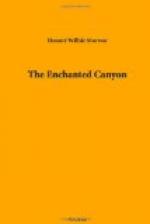“Let’s have the papers, Abbott. I’m not afraid of anything Brown can say.”
Charley grimly handed the papers to the Secretary and returned to the observation platform.
A reporter had seen Enoch in the gambling house on the evening of Diana’s departure for the Canyon. He had learned something from the gambling house keeper of the Secretary’s several trips there. The reporter had then, with devilish ingenuity, followed Enoch back to Minetta Lane, where he had found Luigi. Then followed eight or ten paragraphs in Luigi’s own words, giving an account of Enoch and Enoch’s mother. The whole story was given with a deadly simplicity, that it seemed to the Secretary must carry conviction with it.
As Enoch had told Abbott, he had weathered much political mud slinging, but even his worst political enemies had spared him this. His adherents had made much of the fact that Enoch was slum bred and self made. That was the sort of story which the inherent democracy of America loved. But the Brown account made of Enoch a creature of the underworld, who still loved his early haunts and returned to them in all their vileness. And in all the years of his political life, no newspaper but this had ever mentioned Enoch’s mother. The tale closed with a comment on the fact that Enoch, who shunned all women, had been seen several times in Washington giving marked attention to Miss Diana Allen. Diana and her work were fully identified.
Enoch read the account to the last word, a flush of agonizing humiliation deepening on his face as he did so. When he had finished, he doubled the paper carefully, and laid it on the chair next to his. Then he lighted a cigarette and sat with folded arms, unseeing eyes on the newspaper. When Jonas came in an hour later, the cigarette, unsmoked, was cold between the Secretary’s lips. With trembling hands, the colored man picked up the paper and with unbelievable venom gleaming in his black eyes, he carried it to the rear door, spat upon it and flung it out into the desert night. Then he returned to Enoch.
“Mr. Secretary,” he said huskily, “let me take your keys.”
Mechanically Enoch obeyed. Jonas selected a small key from the bunch and, opening a large leather portfolio, he took out the black diary. This he placed carefully on the folding table which stood at Enoch’s elbow. Then he started toward the door.
The Secretary did not look up. Nor did he heed the colloquy which took place at the door between Jonas and Abbott.
“How is he, Jonas?”
“I ain’t asked him. He’s a sick man.”
“God! Let me come in, Jonas.”
“No, sir, you ain’t! How come you think you kin talk to him when even I don’t dast to?”
“But he mustn’t be alone, Jonas.”
“He ain’t alone. I left him with his Bible. Ain’t nobody going to trouble him this night.”
“I didn’t know he read the Bible that way.” Abbott’s voice was doubtful.




